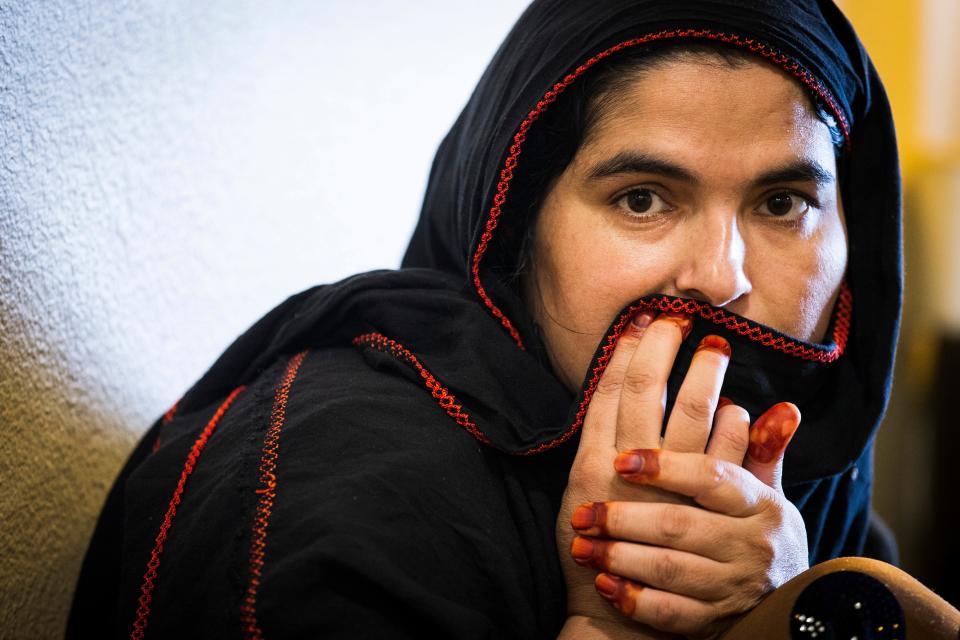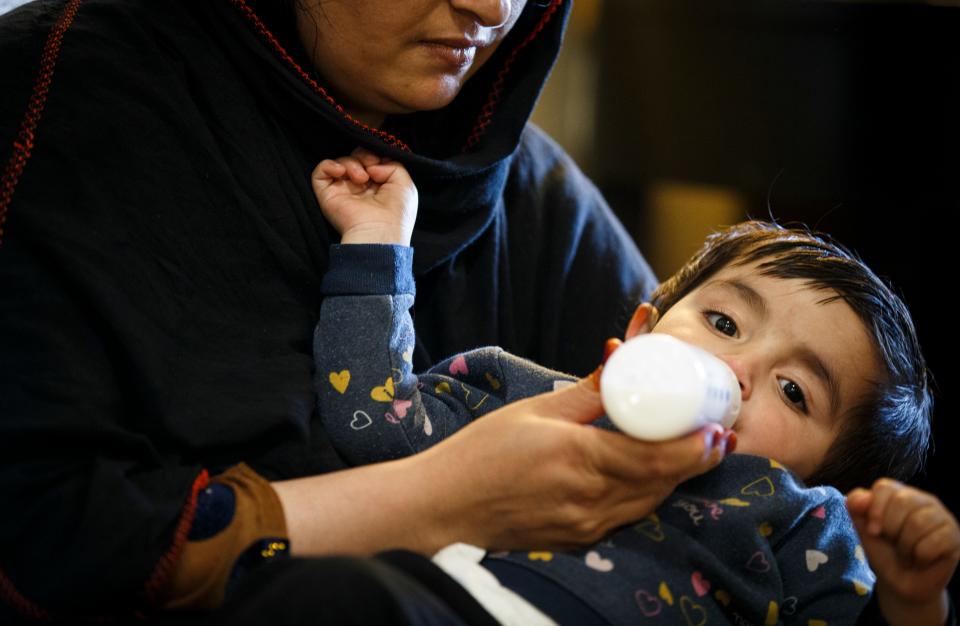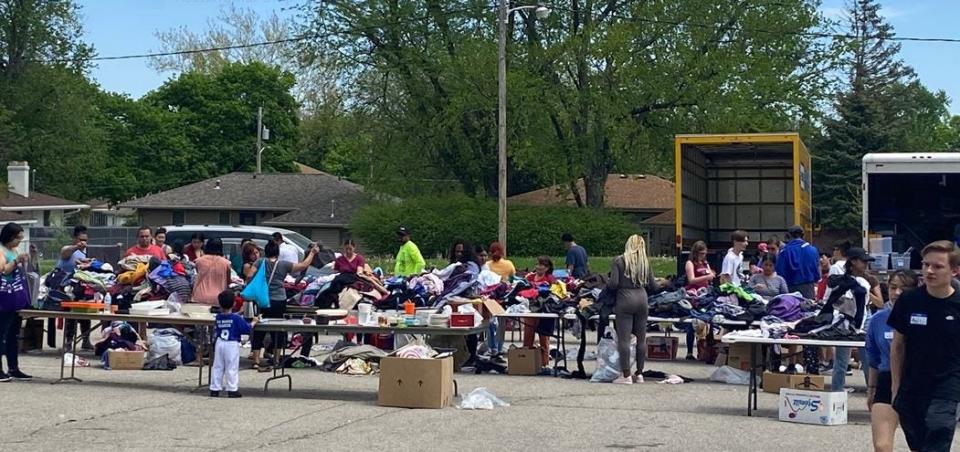Des Moines volunteer group alleges resettlement agencies aren't meeting Afghan refugees' needs
Part of an ongoing series.
Bakhti Momand said he tried to contact his Catholic Charities refugee resettlement caseworker after he got a call from his son at work and learned that his wife, Hafisa, had suffered an apparent heart attack.
The caseworker “should know that whenever I call, there’s a problem,” Momand, a central Iowa refugee from Afghanistan, said through an interpreter. “But she didn’t pick up.”
When Momand couldn’t reach the caseworker, he said, his son searched for help in the extended stay hotel in West Des Moines where the family lives with six or seven other Afghan families. The boy found another refugee, Feroz Rasheedzai, who spoke English and was able to call 911.

In the months since more than 700 Afghan families began arriving in the Des Moines metro after the end of America's longest-running war, medical emergencies, inadequate food assistance and other crises have been an ongoing challenge both for the nonprofit agencies that receive federal money to manage the resettlement and volunteers trying to assist the new arrivals.
In a rare move this week, Des Moines Refugee Support, which has worked with hundreds of newly arrived Afghan families, filed complaints against two of Des Moines’ three resettlement agencies, alleging they aren’t meeting families' needs..
In the nonprofit abuse complaints to the Iowa Attorney General's Office, Sadina Traljesic, a board member of Des Moines Refugee Support, alleges Catholic Charities and Lutheran Services in Iowa also have refused to release information that would aid volunteers in helping families with necessities such as medical services and rental and food assistance, and with help getting jobs.
In addition, Traljesic said she would be filing a complaint with the U.S. Department of Health and Human Services, which has an Office of Inspector General charged with protecting the integrity of the department's programs and their beneficiaries.
She told the Des Moines Register there have been children who have needed surgery or medical help who couldn't get transportation from caseworkers, families who lost out on housing opportunities because caseworkers didn't screen apartments on time, and families who weren't given enough food or who still didn't have food assistance.
"Even when we've sent urgent messages about their clients having no food, they haven't gotten back to us, their clients, nor have they resolved those issues. We've had to host food drives in order to make sure their clients don't go hungry again," she said.
"We've had several incidents where food stamps and Medicaid have been cut due to the case managers not completing or submitting paperwork," she said. "When we offered help with the paperwork, they've refused our help. When we've scheduled medical appointments, they have failed in providing transportation."

Neither Catholic Charities nor Lutheran Services in Iowa responded to emails this week seeking comment.
Traljesic said the agencies have declined to share information even though families have signed releases waiving privacy limitations.
“To date we have not received any requested information. We have asked to meet with the agencies and those requests have been denied,” she said in her complaint. “They have refused to explain why they will not honor the signed releases.”
Lynn Hicks, a spokesperson for the attorney general's office, said the assistant attorney general who oversees nonprofit complaints has been out of the office this week, so no decision has been made on the complaint.
"As it stands now, the complainant did not provide enough information to show how the nonprofits violated the Iowa Nonprofit Corporation Act, but we would consider any other information that the organization can provide," he wrote in an email.
Any complaint to a federal Office of Inspector General, like the one for the Department of Health and Human Services, would be reviewed. If it is deemed credible, the office would either investigate, initiate an audit or refer the complaint to another agency.
A right to privacy or a duty to help?
Social workers have an ethical duty to ensure refugees receive food, medical attention and housing, as well as have an understanding of the trauma of being uprooted, according to the code of ethics of the National Association of Social Workers.
According to the National Organization for Human Services, social workers who work with refugees families also are bound by ethical standards to protect clients' right to privacy and confidentiality "except when such confidentiality would cause serious harm to the client or others, when agency guidelines state otherwise, or under other stated conditions (e.g., local, state, or federal laws)."
The clash between Des Moines Refugee Support, whose mission is to fill gaps in assistance to refugees, and local resettlement agencies has been ongoing.
In April, numerous Afghans living in the extended stay hotels described to two Des Moines Register reporters how they had been struggling for months, lacking affordable housing and enough assistance until volunteers stepped up. Some had gone hungry; others had serious medical issues that had gone untreated; others complained they had been forgotten or ignored by their caseworkers.
Previously:
Afghan family of 14 resettled in Urbandale says they've gone days without food and other supplies
Afghan family living in Urbandale hotel says military camp was better: 'Every night, I cry'
As Afghans struggle, Iowa is poised to take refugees from Ukraine. But is the state ready?
Why some Afghan refugees have fared better in Sioux City, Cedar Rapids than in Des Moines
Central Iowa is springing to action to help Afghan refugees. Here's how you can, too.
Some who helped the U.S. military and intelligence during the war said the lack of assistance was hurtful and troubling.
Resettlement agency leaders acknowledged to the Register that their staffs have been overwhelmed by the hundreds of families who have arrived in the Des Moines area. The influx followed steep cuts to their budgets during the Trump administration's slowdown of refugee resettlement.
They said they had to focus what resources they have on trying to meet the most urgent needs of the newcomers.
“The ability to respond to everyone in a timely manner — we just don’t have that capacity," said Kerri True-Funk, director of USCRI's Des Moines field office. Traljesic said USCRI is the one Des Moines metro resettlement agency that has been responsive to requests for information.
Progress in the making, but some refugees say they're still ignored
Visits over the past week to a spring free store event attended by more than 600 new refugee and immigrant families and to the extended stay hotels where many Afghans have been living showed that while most are progressing in their new lives, their needs continue.
More than 45 families had lined up by 5:30 a.m. Saturday to pack cars with bags full of clothing, furniture, lights, car seats and children’s books at Debra Heights Wesleyan Church in Des Moines. By midafternoon, the crowd outside the church on Lower Beaver Avenue was so large, several sheriff’s deputies had arrived to help direct traffic.
When the event was over, two 26-foot moving trucks full of donated items from across the metro had been emptied.

"I'm grateful a lot of people were able to come and get their necessities," said Alex Rogers, who has been volunteering with Des Moines Refugee support since his early days as a Drake University football player. "From a big-picture standpoint, it's really cool to see people having that kind of impact."
While resettlement agencies have focused their attention on finding the refugees jobs and apartments in the metro's cut-throat housing market, some families have been difficult to place.
Rasheedzai said his family and two others, who currently live in the Extended Stay America in West Des Moines, want housing near each other because he is the only English speaker among the adults.
He said that until recently, all the housing his caseworker could find was either too far from public transportation and schools, infested with bugs, had broken-down air conditioning, or was too expensive.
"We are new. We have to find a place to stay for a while to stand on our own feet," he said.
In one case the families found apartments they liked, but they were rented by others because their caseworkers didn't act fast enough to help secure them, he said.
Recently, the families finally located apartments on their own and are awaiting word on their rental applications.
Abdul Hamid, whose family arrived in Des Moines nearly a month ago, said on Monday his family still had no food assistance, pocket money or a medical card from Catholic Charities.
In Afghanistan, he said, his wife was a doctor who worked at an ob-gyn clinic and was attacked by a member of the Taliban, who hit her with an AK-47 at a checkpoint.
Now she's being told her only job prospects for the time being may be working at a manufacturing plant.
"Had we known, we might not have left," Hamid said through an interpreter
Lee Rood's Reader's Watchdog column helps Iowans get answers and accountability from public officials, the justice system, businesses and nonprofits. Reach her at lrood@registermedia.com, at 515-284-8549, on Twitter at @leerood or on Facebook at Facebook.com/readerswatchdog.
This article originally appeared on Des Moines Register: Volunteers file complaint over Afghan refugee resettlement issues

